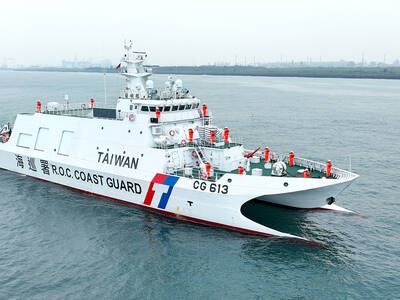Hsinchu County Commissioner Chiu Ching-chun (邱鏡淳) joined Sinpu Township (新埔) officials and scores of local residents at a rally yesterday to protest against pollution of the township’s water source. The protesters said a central government policy allows the industrial pollution of a river that supplies water to Sinpu for drinking and irrigation purposes.
Following the protest, Chiu, Sinpu Township Mayor Lai Chiang-hai (賴江海) and Sinpu Council Speaker Wang Tseng-chi (王增基) headed for Taipei, where they said they would petition the legislature and Control Yuan to “return justice to the local residents.”
The dispute revolves around two high-tech manufacturing companies that have for many years released industrial wastewater into Siaoli River (霄裡溪) in Sinpu, which is a catchment area.
At the rally in front of the Hsinchu County Government building, protesters wore headbands that read “Refuse to Drink Toxic Water” and shouted slogans, pledging their determination to stop Chunghwa Picture Tubes and AU Optronics Corp (AUO) from polluting their drinking water source.
On Monday, Environmental Protection Agency (EPA) Minister Stephen Shen (沈世宏) told lawmakers that if AUO could not find another wastewater disposal location by the end of the month, its plants would be shut down. However, Chiu said his administration on Tuesday received an official notice from the EPA declaring that the Siaoli River would no longer serve as a source of drinking water.
Instead of drawing water from the river, the EPA notice said, Hsinchu County residents should go upstream to where Siaoli and Fongshan rivers (鳳山溪) merge. The central government claimed its policy took into consideration “the needs of both the local community and industry,” Chiu said, citing the notice.
Chiu accused the central government of “legalizing a controversial measure” by permitting the two companies to keep polluting the Siaoli River, damaging the health of local residents and imposing on the right of farmers to irrigate their crops with clean water. Wang said some local farmers have complained that consumers have had doubts about crop safety since learning that the water in Siaoli River is being used for irrigation.
Chinese Nationalist Party (KMT) Legislator Hsu Hsin-ying (徐欣瑩), who represents an electoral district in the county, accused the EPA of “helping [industries] to play foul.”
In response, Shen said the EPA was acting “in accordance with the law,” since Siaoli River has not been designated as a source of drinking water after several rounds of environmental impact assessment meetings.
Shen added, however, that he would continue urging the two companies to reduce the volume of pollutants they discharge into the river.

A total lunar eclipse coinciding with the Lantern Festival on March 3 would be Taiwan’s most notable celestial event this year, the Taipei Astronomical Museum said, urging skywatchers not to miss it. There would be four eclipses worldwide this year — two solar eclipses and two lunar eclipses — the museum’s Web site says. Taiwan would be able to observe one of the lunar eclipses in its entirety on March 3. The eclipse would be visible as the moon rises at 5:50pm, already partly shaded by the Earth’s shadow, the museum said. It would peak at about 7:30pm, when the moon would

The Coast Guard Administration (CGA) yesterday held a ceremony marking the delivery of its 11th Anping-class offshore patrol vessel Lanyu (蘭嶼艦), saying it would boost Taiwan’s ability to respond to Beijing’s “gray zone” tactics. Ocean Affairs Council Deputy Minister Chang Chung-Lung (張忠龍) presided over the CGA event in the Port of Kaoshiung. Representatives of the National Security Council also attended the event. Designed for long-range and protracted patrol operations at sea, the Lanyu is a 65.4m-long and 14.8m-wide ship with a top speed of 44 knots (81.5kph) and a cruising range of 2,000 nautical miles (3704km). The vessel is equipped with a

DEFENSE: The US should cancel the US visas or green cards of relatives of KMT and TPP lawmakers who have been blocking the budget, Grant Newsham said A retired US Marine Corps officer has suggested canceling the US green cards and visas of relatives of opposition Taiwanese lawmakers who have been stalling the review of a proposed NT$1.25 trillion (US$39.7 billion) special defense budget. The Executive Yuan has proposed the budget for major weapons purchases over eight years, from this year to 2033. However, opposition lawmakers have refused to review the proposal, demanding that President William Lai (賴清德) first appear before the Legislative Yuan to answer questions about the proposed budget. On Thursday last week, 37 bipartisan US lawmakers sent a letter to Legislative Speaker Han Kuo-yu (韓國瑜), the heads

Two siblings in their 70s were injured yesterday when they opened a parcel and it exploded, police in Yilan said, adding the brother and sister were both in stable condition. The two siblings, surnamed Hung (洪), had received the parcel two days earlier but did not open it until yesterday, the first day of the Lunar New Year holiday in Taiwan, police said. Chen Chin-cheng (陳金城), head of the Yilan County Government Police Bureau, said the package bore no postmark or names and was labeled only with the siblings’ address. Citing the findings of a